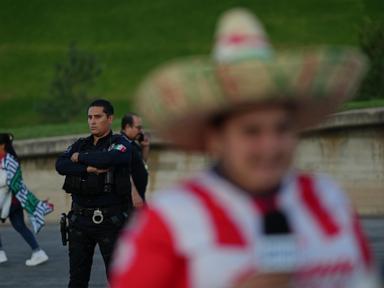World
World Cup Excitement Meets Harsh Reality of Cartel Violence in Jalisco

As soccer fans gathered in Zapopan, Mexico, for a friendly match on October 14, 2023, they chanted “Mexico! Mexico!” while navigating a landscape marked by heightened security measures. Authorities deployed police officers, bomb-sniffing dogs, and drone jammers in preparation for the upcoming 2026 FIFA World Cup. Just a few miles away, the situation was starkly different: National Guard troops stood watch as volunteers searched an abandoned property for some of the estimated 134,000 missing individuals in Mexico.
This juxtaposition is particularly pronounced in Jalisco, a state poised to host four World Cup matches in June 2026. Jalisco is home to the Jalisco New Generation Cartel (CJNG), one of the most powerful criminal organizations in Mexico, with an estimated 19,000 members and operations in 21 of Mexico’s 32 states. With a population of 8 million, Jalisco leads the nation in disappearances and ranks among the top four states in terms of crime rate. As of October, the state had reported approximately 1,000 disappearances, reflecting a 30% increase from the previous year, according to Mexico’s National Search Commission.
Contrasting Perspectives on Security
Despite the grim backdrop, neither the soccer fans nor the officials responsible for security expressed alarm about hosting a major international event in a region dominated by cartel violence. Many believe that such events create a temporary truce between criminals and the government. “If you don’t get yourself into trouble, nothing will happen,” said Javier Rodríguez, an 18-year-old college student en route to the stadium.
In stark contrast, Indira Navarro and her fellow volunteers from the Jalisco Search Warriors were digging behind an abandoned house following a tip-off regarding potential human remains. These volunteers dedicate their free time to searching for missing relatives, hoping for closure for themselves and other families. Although their search that day yielded no results, they previously uncovered hundreds of garments and burned bone fragments at a site authorities had raided the year before. Navarro has been searching for her brother, who disappeared in the neighboring state of Sonora in 2015, and has lived under the protection of the National Guard since receiving threats after publicizing their findings.
Government and Experts Weigh In
The Jalisco New Generation Cartel has gained notoriety for its bold attacks against authorities, including a 2020 attempt on a police chief in Mexico City. In 2023, the administration of former President Donald Trump designated the cartel as a foreign terrorist organization. According to Roberto Alarcón, Jalisco’s state security strategy coordinator, the lack of multiple criminal groups in the state facilitates more effective security operations. He noted that major crimes in Jalisco are trending downward, despite the cartel’s presence.
Security analyst David Saucedo anticipates a tacit agreement between the cartel and the government, suggesting that law enforcement may refrain from capturing cartel leaders during the World Cup, provided the cartel avoids high-profile actions. “I think both sides will agree to a truce that, obviously, might not last very long,” Saucedo remarked. He added that organized crime is likely to exploit the World Cup to escalate activities such as drug sales, ticket reselling, and even sexual tourism.
Addressing the media a day before the friendly match, Pablo Lemus, the governor of Jalisco, alongside local politicians and soccer federation officials, spoke about the anticipated benefits of hosting the World Cup. They projected that the event could generate $1 billion in revenue and create up to 7,000 jobs in tourism and construction, highlighting efforts to add 12,000 hotel rooms before the tournament.
For event producer Johana Jaramillo, working in a fan zone outside the stadium, the paradox of hosting a major international event amid ongoing violence is stark. “These events help slightly repair social pain and bring the opportunity for better security measures simply because so many people are attending,” she noted. Jalisco is investing in security infrastructure, including an additional 3,000 surveillance cameras, which will bring the total to over 10,000, creating a legacy that could benefit residents long after the World Cup ends.
Yet for individuals like Navarro, who are engaged in the relentless search for their loved ones, the excitement surrounding the World Cup feels like an attempt to obscure the reality of violence in Jalisco. “They want to wash away everything that has to do with the issue of the disappeared. But they won’t be able to do so because we’re going to continue fighting,” she asserted.
As the countdown to the 2026 FIFA World Cup continues, the disparity between the festive atmosphere and the ongoing struggles with cartel violence remains a poignant reminder of the complexities facing Jalisco and its residents.
For further updates on the situation in Latin America and the Caribbean, follow coverage from reputable news sources.
-

 Science3 weeks ago
Science3 weeks agoIROS 2025 to Showcase Cutting-Edge Robotics Innovations in China
-

 Politics3 weeks ago
Politics3 weeks agoJudge Considers Dismissal of Chelsea Housing Case Citing AI Flaws
-

 World3 weeks ago
World3 weeks agoBravo Company Veterans Honored with Bronze Medals After 56 Years
-

 Lifestyle3 weeks ago
Lifestyle3 weeks agoStone Island’s Logo Worn by Extremists Sparks Brand Dilemma
-

 Health3 weeks ago
Health3 weeks agoStartup Liberate Bio Secures $31 Million for Next-Gen Therapies
-

 Top Stories3 weeks ago
Top Stories3 weeks agoIndonesia Suspends 27,000 Bank Accounts in Online Gambling Crackdown
-

 Health3 weeks ago
Health3 weeks agoTop Hyaluronic Acid Serums for Radiant Skin in 2025
-

 Sports3 weeks ago
Sports3 weeks agoMel Kiper Jr. Reveals Top 25 Prospects for 2026 NFL Draft
-

 World3 weeks ago
World3 weeks agoHoneywell Predicts Record Demand for Business Jets Over Next Decade
-

 Lifestyle3 weeks ago
Lifestyle3 weeks agoMary Morgan Jackson Crowned Little Miss National Peanut Festival 2025
-

 Sports3 weeks ago
Sports3 weeks agoYamamoto’s Mastery Leads Dodgers to 5-1 Victory in NLCS Game 2
-

 Science3 weeks ago
Science3 weeks agoArizona State University Transforms Programming Education Approach









